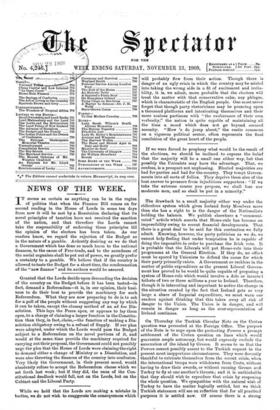Granted that the Lords decide upon demanding the decision of
the country on the Budget before it has been tasted—in fact, demand a Referendum—it is, in our opinion, their busi- ness to do their best to provide the machinery for such Referendum. What they are now preparing to do is to ask for a poll of the people without suggesting any way by which it can be taken, except the clumsy method of an ad hoc Dis- solution. This lays the Peers open, or appears to lay them open, to a charge of claiming a larger function in the Constitu- tion than they, in fact, claim,—the function of making a Dis- solution obligatory owing to a refusal of Supply. If our plan were adopted, under which the Lords would pass the Budget subject to a Referendum on the novel portions of it, and would at the same, time provide the machinery required for carrying out their proposal, the Government could not possibly urge the plea that the House of Lords were claiming the right to demand either a change of Ministry or a Dissolution, and were also throwing the finances of the country into confusion. Very likely the Government, in their present mood, would absolutely refuse to accept the Referendum clause which we set forth last week ; but if they did, the onus of the Con- stitutional deadlock would fall, not on the Lords, but on the Cabinet and the Liberal Party.














































